Letter Of Sympathy Army
[Your Name]
[Your Address]
[City, State, Zip Code]
[Email Address]
[Phone Number]
[Date]
[Recipient's Name]
[Rank and Unit]
[Address]
[City, State, Zip Code]
Dear [Recipient's Name],
I am writing to extend my deepest sympathy and condolences to you and your entire unit during this difficult time. It is with a heavy heart that I learned about the loss of your fellow soldier, [Name of the deceased]. Please know that you and your comrades are in my thoughts and prayers during this challenging period.
As civilians, we may not fully comprehend the sacrifices and challenges that the brave men and women of the military face every day. The loss of a fellow soldier is a profound tragedy that touches the lives of everyone in your unit and beyond. [Name of the deceased] dedicated their life to the service of our country, and their courage and selflessness will never be forgotten.
Words can never truly express the depth of sorrow felt in such circumstances, but I hope that you and your fellow soldiers find some solace in the memories of the times you shared with [Name of the deceased]. Their bravery, loyalty, and commitment to duty serve as an inspiration to us all.
Please convey my condolences to [Name of the deceased]'s family and friends. I understand that this loss affects not only the military family but also their loved ones back home. Their sacrifice is immeasurable, and their memory will forever be cherished.
During this challenging time, I pray that you and your unit find strength and support in one another. Lean on your fellow soldiers for comfort and camaraderie, and do not hesitate to reach out to others for assistance or a listening ear. Your dedication to each other is a testament to the strength of the military community.
Once again, please accept my deepest sympathies. May the memories of [Name of the deceased] be a source of comfort and peace in the days ahead. You have my utmost gratitude for your service and sacrifice, and I will keep you all in my thoughts and prayers.
With heartfelt condolences,
[Your Name]
Death of Service Member - Formal Letter
Dear [Family Name/Mrs. Smith],
Subject: Heartfelt Condolences on the Loss of [Rank] [Full Name]
Please accept my deepest sympathies on the tragic loss of your [son/daughter/husband/wife], [Rank] [Full Name]. As [his/her] commanding officer, I had the privilege of serving alongside [First Name] and witnessing firsthand [his/her] dedication, courage, and unwavering commitment to our mission and fellow soldiers.
[First Name] was an exemplary soldier who embodied the values of honor, duty, and selfless service. [His/Her] leadership during [specific mission/operation] demonstrated exceptional bravery and saved the lives of [his/her] fellow service members. The impact [he/she] made on our unit and the bonds [he/she] formed with [his/her] brothers and sisters in arms will never be forgotten.
During this difficult time, please know that our entire unit stands with you and your family. We share in your grief and will forever remember [First Name]'s sacrifice. The Army family is here to support you through this challenging period, and we will ensure that [his/her] legacy of service continues to inspire future generations of soldiers.
If there is anything our unit can do to assist you during this time, please do not hesitate to reach out. We are honored to have served with [First Name] and will carry [his/her] memory with us always.
With deepest respect and condolences,
[Your Rank and Full Name]
[Unit/Battalion]
[Contact Information]
Combat Injury - Heartfelt Message
Dear [First Name],
Subject: Thinking of You During Your Recovery
I hope this message finds you in good spirits despite the circumstances. The entire unit has been thinking about you since we heard about your injuries sustained during the operation in [location]. Your courage under fire and dedication to the mission exemplify everything we stand for as soldiers.
I want you to know that your sacrifice has not gone unnoticed. The way you protected your squad members and completed the objective despite being wounded shows the heart of a true warrior. Every soldier in our unit looks up to you, and we're all pulling for your complete recovery.
The team here is holding down the fort, but it's not the same without your leadership and that terrible sense of humor that somehow keeps everyone's spirits up during the toughest times. [Specific memory or joke]. We're all looking forward to having you back when you're ready.
Focus on your recovery and know that you have an entire Army family supporting you. We're here for whatever you need, whether it's someone to talk to or help with anything back home. Take care of yourself, soldier.
Stay strong and heal well,
[Your Name]
[Rank and Unit]
Family Emergency Leave - Professional Email
Dear [Rank] [Last Name],
Subject: Condolences and Leave Authorization
I was deeply saddened to learn about the passing of your [relationship - father/mother/spouse]. Please accept my sincere condolences on behalf of the entire [Unit Name]. Losing a loved one is never easy, and I can only imagine how difficult this time must be for you and your family.
Your emergency leave request has been approved effective immediately for [number] days, with the possibility of extension if needed. Please coordinate with [Name/Position] regarding any ongoing responsibilities and ensure proper handover of duties before departure.
During this time, your focus should be on being with your family and taking care of the arrangements that need to be made. The unit will manage your duties, so please don't worry about work responsibilities while you're grieving and supporting your family.
If you need any assistance with travel arrangements, additional leave time, or support services, please reach out to me directly or contact the Family Readiness Group. We're here to help in any way we can.
Our thoughts and prayers are with you and your family during this difficult time.
Respectfully,
[Your Name]
[Rank and Position]
[Contact Information]
Unit Tragedy - General Message
Dear Soldiers and Families of [Unit Name],
Subject: Standing Together in Difficult Times
It is with heavy hearts that we address the recent tragic events that have affected our unit family. The loss of our fellow soldiers has left us all grieving and searching for ways to support each other through this incredibly difficult time.
Our unit has always prided itself on being more than just soldiers serving together – we are a family. In times like these, that bond becomes even more important. We must lean on each other, support our fallen comrades' families, and honor their memory through our continued service and dedication.
Grief counseling services are available through the Chaplain's office and Mental Health Services. Please don't hesitate to reach out if you or your family members need support. Sometimes the strongest thing we can do is ask for help.
We will be holding a memorial service on [date] at [time] in [location]. This will be an opportunity for our unit family to come together, share memories, and support each other. Details regarding the service and family support will be provided separately.
Remember that it's okay to not be okay right now. Take care of yourselves and each other. Our fallen brothers and sisters would want us to continue the mission while supporting those they left behind.
We are Army strong, and together we will get through this.
[Your Name]
[Command Position]
[Unit]
Retirement Sympathy - Casual Letter
Dear [First Name],
Subject: Support During Your Transition
I heard about your loss just as you're preparing for retirement, and I wanted to reach out personally. Losing [relationship] during such a major life transition must feel overwhelming, and I can't imagine how you're managing everything right now.
You've given so much to the Army over your [number] years of service, and now it's time for your Army family to give back to you. Even though you're transitioning out, you're still one of us, and we want to make sure you have the support you need during this difficult time.
I know retirement planning can wait – right now, focus on your family and the grieving process. If you need help with any of the transition paperwork, retirement ceremonies, or anything else that was on your plate, let us know. We can handle the administrative stuff while you take care of what really matters.
Your years of service and mentorship have shaped so many of us, and now we want to be there for you. Don't try to handle everything alone – that's what battle buddies are for, even in retirement.
Take all the time you need, and remember that your Army family is just a phone call away.
With respect and friendship,
[Your Name]
[Rank and Position]
Spouse Loss - Formal Official Letter
Dear [Rank] [Last Name],
Subject: Official Condolences on the Loss of [Spouse's Name]
On behalf of [Unit/Installation] and the United States Army, I extend our deepest condolences on the tragic loss of your spouse, [Spouse's Name]. Military spouses serve alongside their soldier partners, making sacrifices and providing support that enables our mission success. [His/Her] contributions to our military community will not be forgotten.
As you navigate this difficult time, please know that the full resources of the Army community are available to you and your family. The Family Readiness Group, Chaplain services, and Survivor Outreach Services are all prepared to provide assistance with immediate needs and long-term support.
Your leave request has been approved, and your duties have been reassigned to ensure you can focus entirely on your family and the arrangements that need to be made. If additional time is required, please coordinate with [Name/Position] to extend your leave as necessary.
[Spouse's Name] was an integral part of our military family, and [his/her] loss is felt throughout the entire community. We are committed to ensuring that you and your children receive all the support and benefits you are entitled to during this transition.
Please don't hesitate to contact me directly if there is anything specific our unit can do to assist you during this time. You are not alone in this – your Army family stands with you.
With profound sympathy and respect,
[Your Name]
[Command Position]
[Official Title]
[Contact Information]
Training Accident - Quick Message
Dear [Name],
Subject: Our Thoughts Are With You
Just heard about the training accident and wanted you to know that everyone here is thinking about you and [injured soldier's name]. These kinds of incidents remind us all how dangerous our job can be, even during training.
Medical is handling everything, and [he/she] is getting the best care possible. Don't blame yourself – accidents happen even with all the safety protocols in place. Focus on supporting [him/her] through recovery.
The whole squad is pulling for both of you. Let us know if you need anything at all.
Stay strong,
[Your Name]
What Are Army Sympathy Letters and Why Are They Important
Army sympathy letters are formal or informal written communications expressing condolences, support, and solidarity during times of loss, injury, or hardship within the military community. These letters serve multiple critical purposes: they provide emotional support to grieving service members and their families, maintain unit cohesion during difficult times, demonstrate the Army's commitment to caring for its people, and honor the sacrifices made by soldiers and their families. They represent the Army values of loyalty, duty, and selfless service by ensuring no soldier or family faces tragedy alone.
When Army Sympathy Letters Are Needed
- Death of active duty service member in combat or training
- Serious combat injuries requiring medical evacuation
- Loss of family members requiring emergency leave
- Training accidents resulting in injury or death
- Suicide or mental health related incidents
- Natural disasters affecting military families
- Spouse or dependent deaths
- Retirement transitions coinciding with personal loss
- Unit-wide tragedies affecting multiple soldiers
- Non-combat related deaths or serious illnesses
- Support for soldiers dealing with PTSD or mental health challenges
Who Should Send Army Sympathy Letters
- Commanding officers to subordinates and their families
- Peers and battle buddies to affected soldiers
- Senior enlisted personnel to junior soldiers
- Unit chaplains to grieving service members
- First sergeants to soldiers in their care
- Squad leaders to team members
- Military family members to other military families
- Retired military personnel to active duty soldiers
- Civilian leadership on military installations
- Representatives from veteran organizations
Requirements and Prerequisites Before Sending
- Verify accurate information about the incident or loss
- Obtain proper authorization if writing officially
- Confirm family notification has already occurred through proper channels
- Understand the relationship between sender and recipient
- Research specific details about the service member's contributions
- Coordinate with other unit members to avoid duplicate messages
- Ensure access to appropriate stationery or digital platforms
- Check unit protocols for official correspondence
- Confirm current contact information for recipients
- Consider cultural or religious sensitivities of the recipient
How to Write and Send Army Sympathy Letters
Begin by gathering specific information about the loss and the service member's contributions. Choose appropriate tone based on your relationship and the circumstances. Start with a clear subject line and proper greeting. Express genuine condolences using specific examples of the person's service or character. Offer concrete support rather than vague assistance. Include relevant unit or Army resources available. Close with appropriate military courtesy and contact information. Review for accuracy and sensitivity before sending. Hand-deliver when possible for immediate family, otherwise use expedited mail or secure email for official correspondence.
Formatting Guidelines and Best Practices
Letters should be 2-4 paragraphs for formal correspondence, shorter for casual messages. Use official letterhead for command-level communications. Maintain professional tone while allowing for personal warmth. Include specific service details and accomplishments when appropriate. Avoid clichés like "everything happens for a reason." Use proper military titles and rank structure throughout. For printed letters, use quality paper and clear formatting. Email messages should have clear subject lines and proper signature blocks. Follow chain of command protocols for official communications. Proofread carefully for grammar, spelling, and factual accuracy.
Follow-up Actions After Sending Sympathy Letters
Monitor recipient's response and wellbeing in following weeks. Coordinate with Family Readiness Groups for ongoing support. Follow up on any specific offers of assistance made in the letter. Check in periodically without being intrusive. Attend memorial services or funeral when appropriate. Ensure promised resources or support are delivered promptly. Document official correspondence in personnel files when required. Share information with chaplains or counselors if mental health concerns arise. Continue unit support efforts beyond the immediate crisis period. Remember anniversaries of losses for future acknowledgment.
Common Mistakes to Avoid When Writing
Avoid sharing the news if family hasn't been officially notified. Don't make promises you cannot keep regarding support or assistance. Avoid religious references unless you know the recipient's beliefs. Don't minimize the loss with phrases like "at least" or "it could be worse." Avoid sharing graphic details about incidents or injuries. Don't make the letter about your own experiences with loss. Avoid delays in sending – timing is crucial for impact. Don't send generic form letters without personalization. Avoid inappropriate sharing of information about the incident. Don't forget to proofread for errors that could seem disrespectful.
Pros and Cons of Sending Army Sympathy Letters
Advantages include: Demonstrates unit cohesion and care, provides emotional support during crisis, maintains morale within the unit, honors fallen or injured service members, strengthens military family bonds, offers concrete assistance resources, shows Army values in action, helps with grieving process, preserves military traditions of brotherhood.
Potential disadvantages: Risk of saying wrong thing during emotional time, possible delays in official notification processes, may overwhelm recipients with too many messages, could inadvertently share inappropriate information, might create expectations for ongoing support that cannot be maintained, risk of seeming impersonal if not properly personalized.
Tips and Best Practices for Maximum Impact
Write immediately but take time to craft thoughtful content. Include specific memories or service accomplishments. Offer concrete help rather than vague support. Use the person's name frequently throughout the letter. Share how their service impacted others positively. Keep a copy for follow-up reference. Coordinate with others to avoid overwhelming the recipient. Consider the family's privacy needs and preferences. Use appropriate military terminology correctly. Hand-write personal notes when possible for added warmth. Include your contact information for future communication. Remember that shorter, heartfelt messages often have more impact than lengthy formal letters.

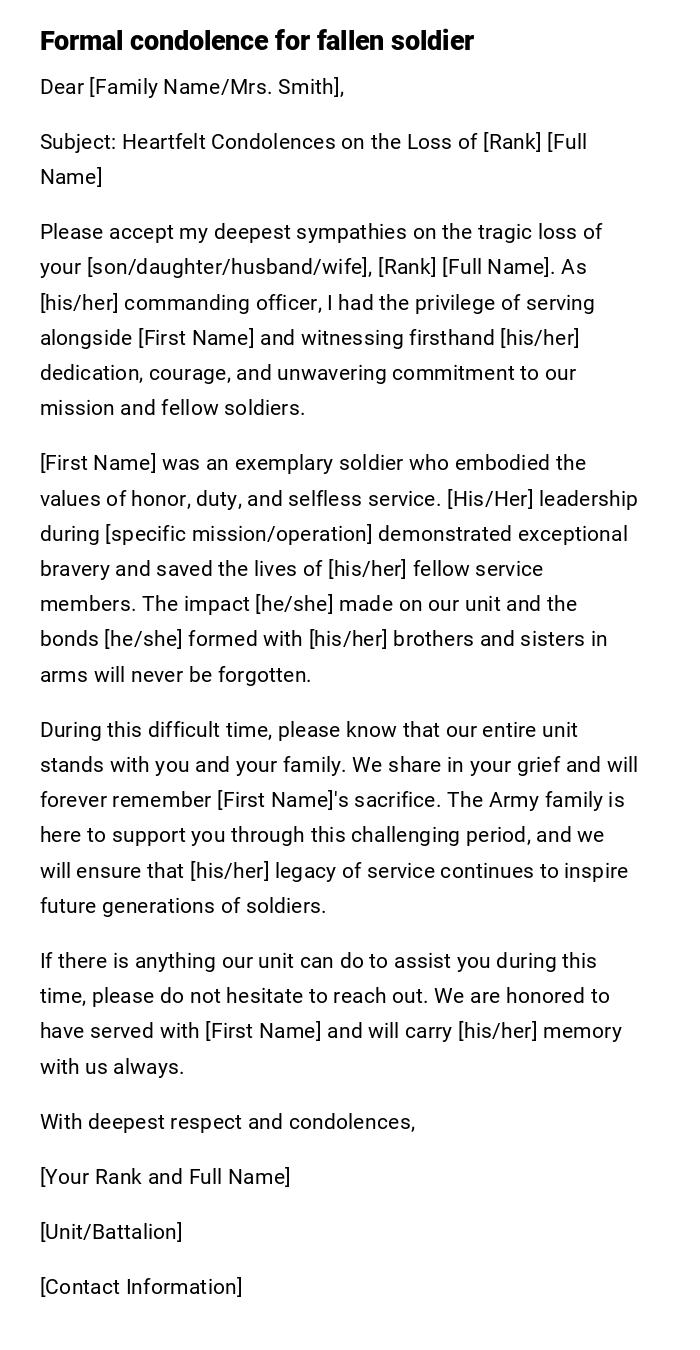
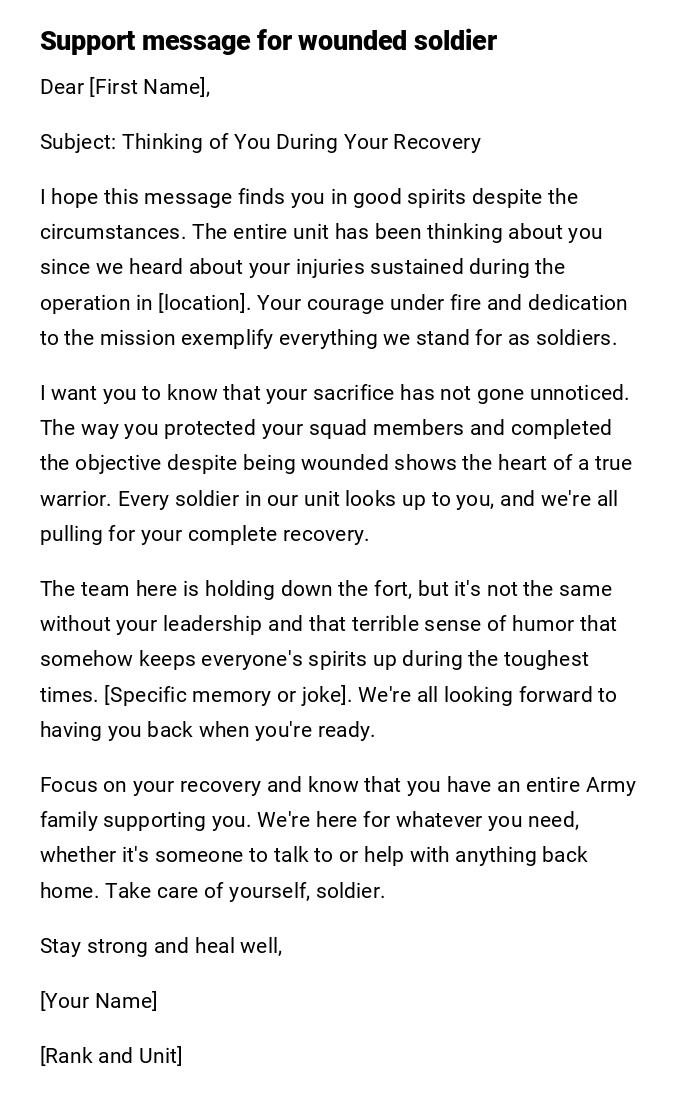
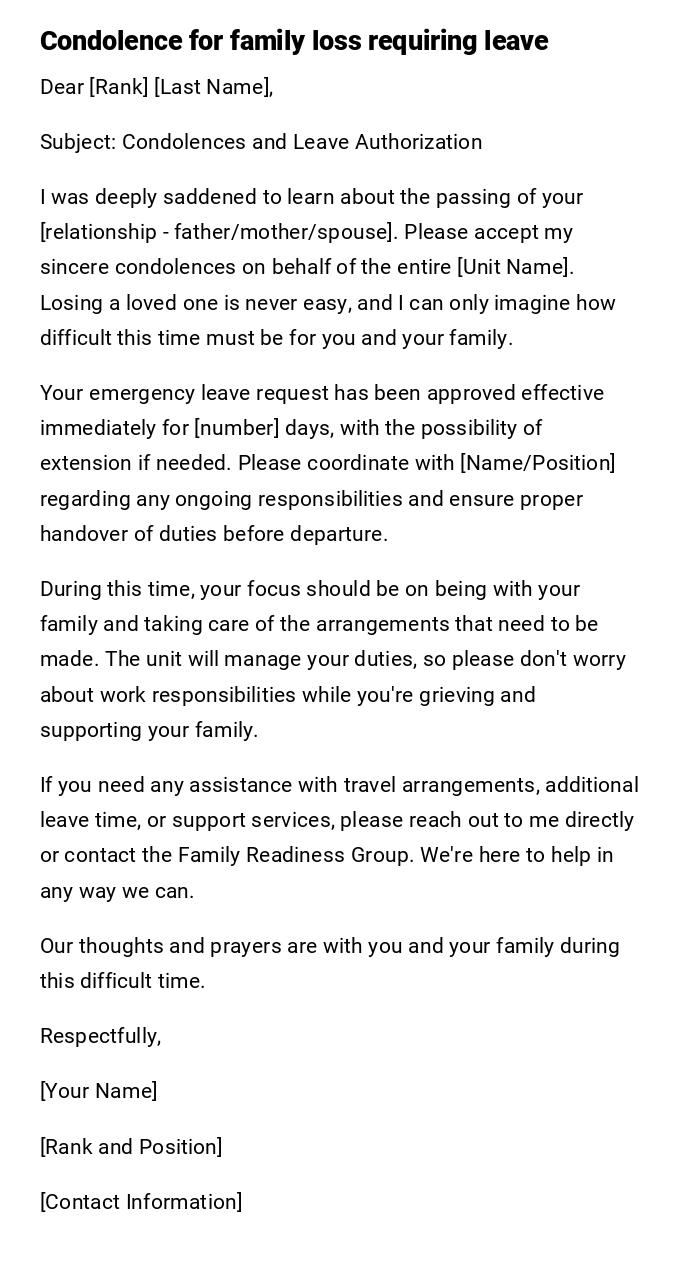
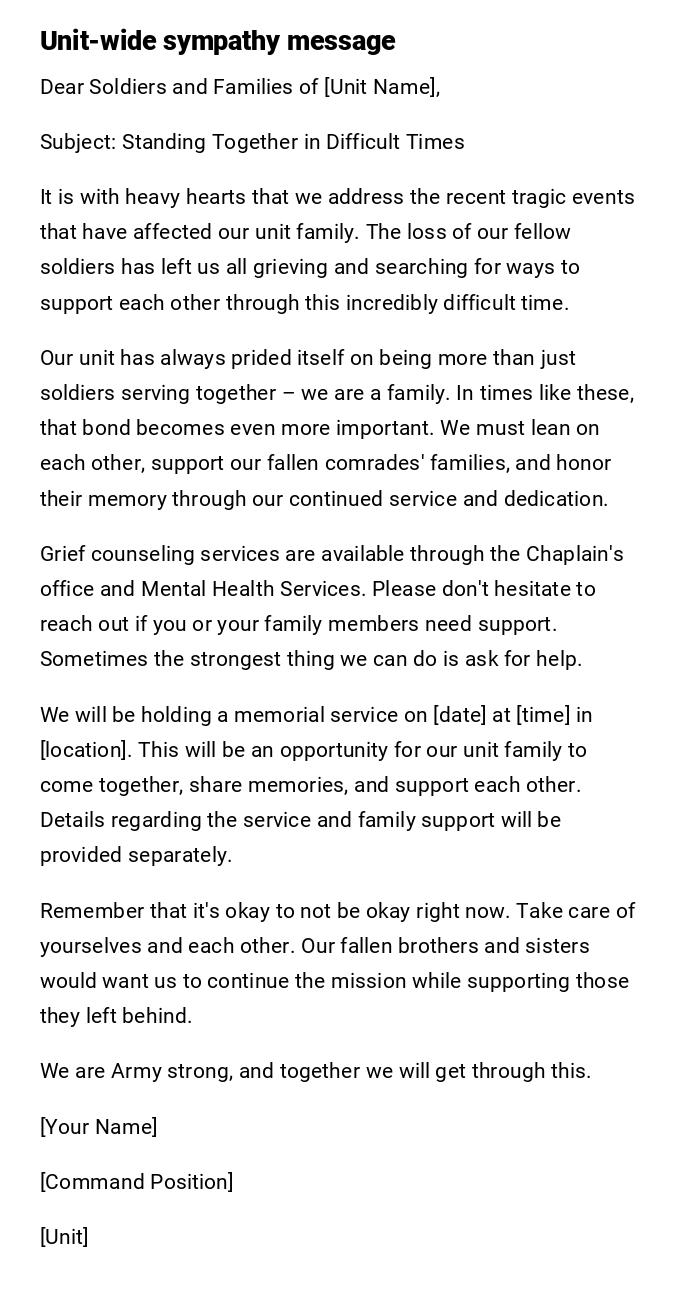
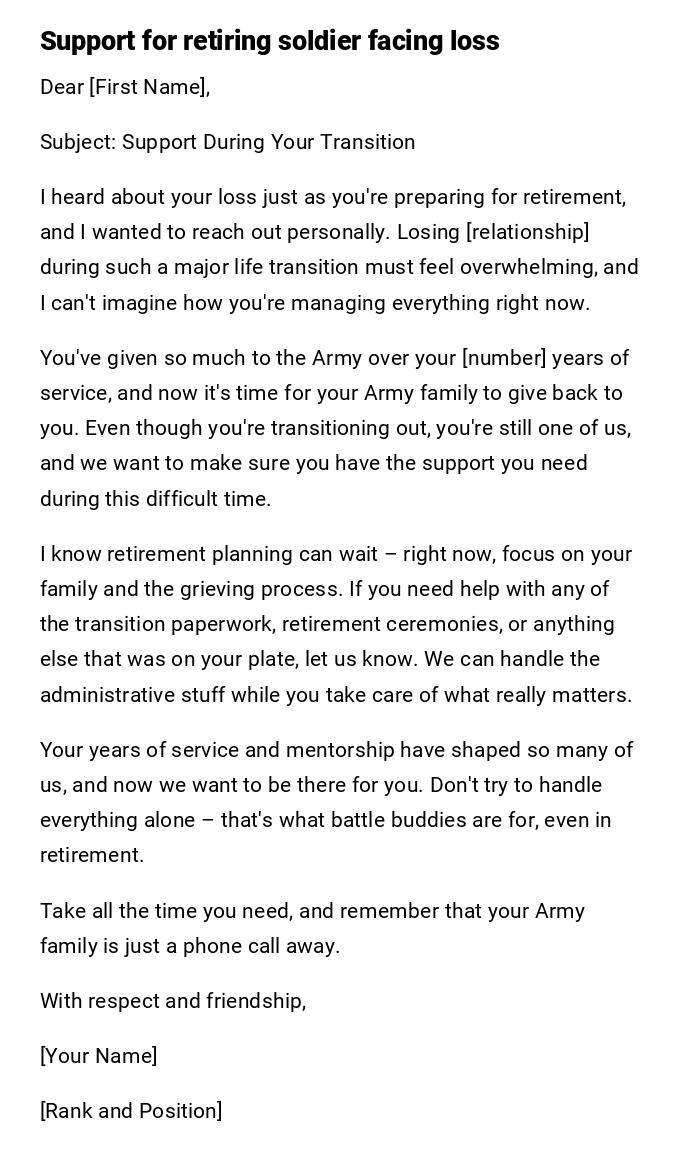
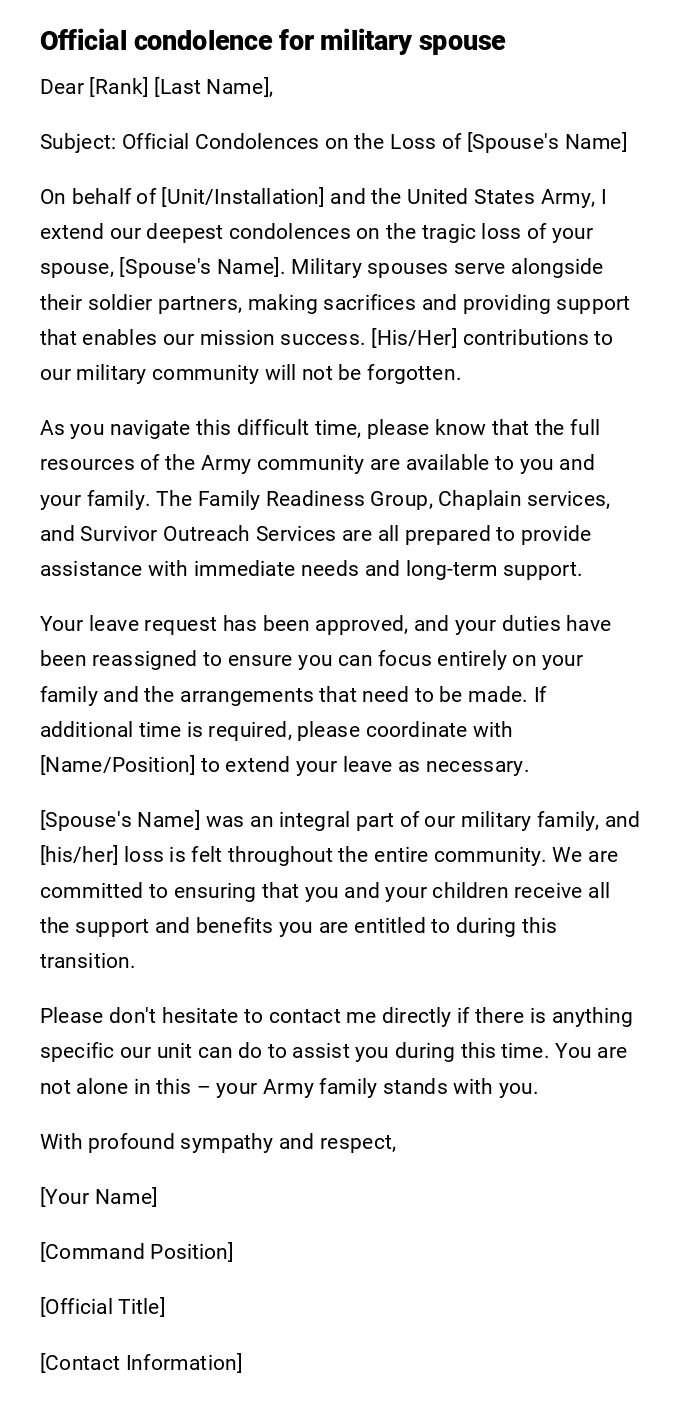
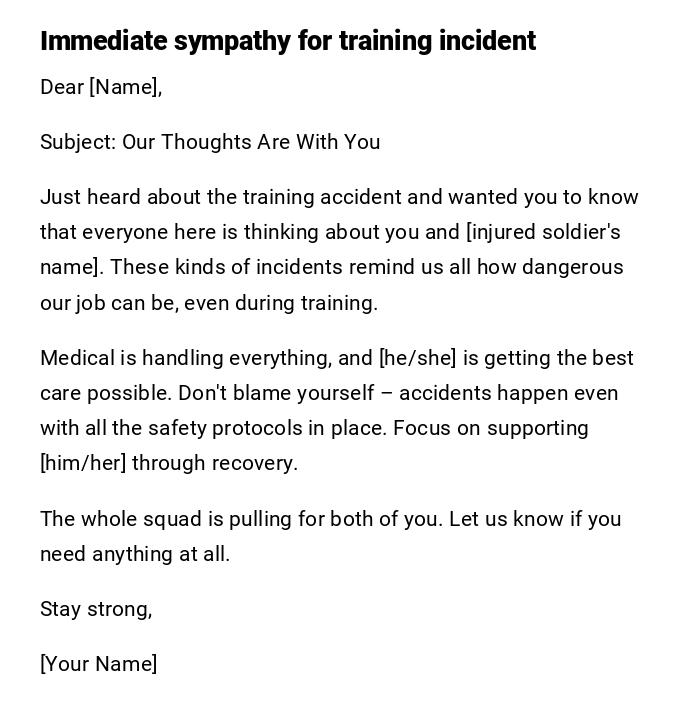

 Download Word Doc
Download Word Doc
 Download PDF
Download PDF